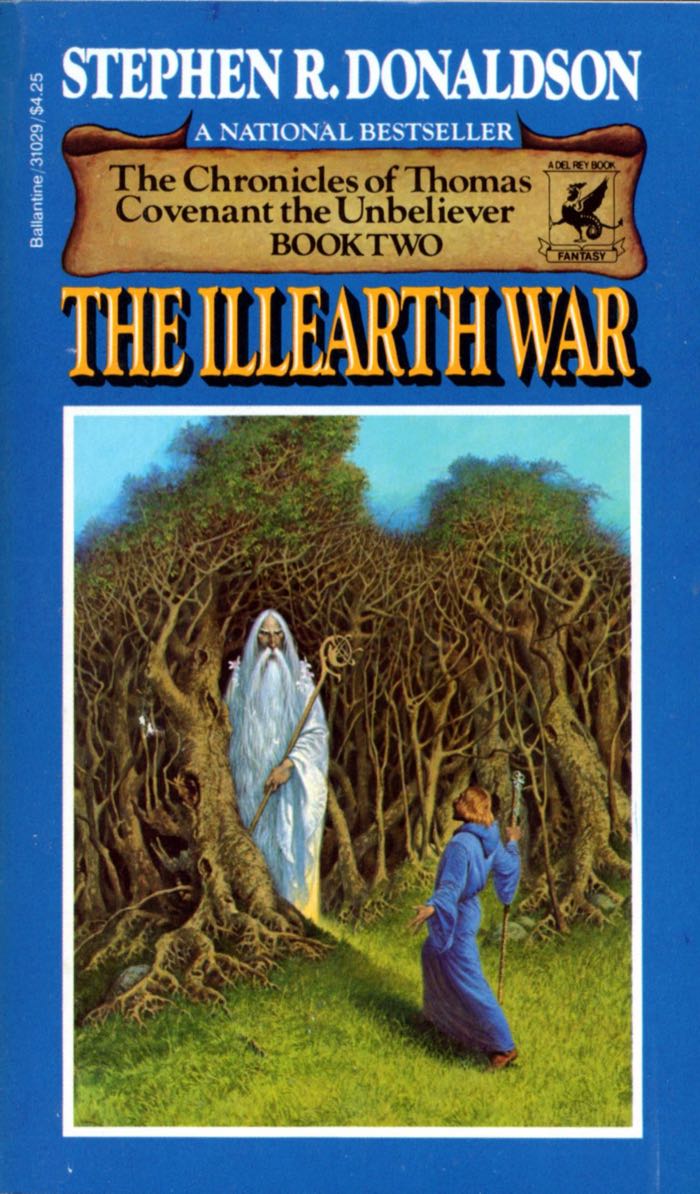The Illearth War
Series: Chronicles of Thomas Covenant 2
Reviewed date: 2006 Aug 3
Rating: 2
428 pages
"Let me tell you something. The only person in life who's free at all, ever, is a person who's impotent. Like me. Or what do you think freedom is? Unlimited potential? Unrestricted possibilities? Hellfire! Impotence is freedom. When you're incapable of anything, no one can expect anything from you. Power has its own limits--even ultimate power. Only the impotent are free."
I hated the first installment in The Chronicles of Thomas Covenant, and the second book is little better. The Illearth War suffers from the same flaws that spoiled Lord Foul's Bane, but Donaldson mitigates the damage: The Illearth War focuses on the new character of Hile Troy, rather than on Thomas Covenant.
1. Battle plans
The plot of The Illearth War is rudimentary: Lord Foul invades The Land. The Land's army is small, but must find a way repel the invaders. Some people find the battle sequences marvelous. "It should be noted that the commander of The Land's armies is Hile Troy and his defensive strategies against the armies of Lord Foul are exhausting, brilliant, and probably unmatched for Big Battles in all fantasy literature." Those people are wrong. Hile Troy's battle strategy is nothing but a series of mistakes so elementary that he should have been executed for treasonous stupidity. The Land only wins because Lord Foul's army is even stupider.
- Hile Troy's entire strategy depends on getting 20 days advance warning of enemy troop movements. When he gets only 15 days warning, his scheme is utterly ruined, and he has no contingency plans.
- Hile Troy fails to gather adequate intelligence on the size of Lord Foul's army. When the army turns out to be larger than he expected, Troy realizes his battle strategy is inappropriate and insufficient. Gee, it's too bad he already wagered everything on this harebrained strategy and has no backup plan. Idiot.
- Troy doesn't tell anybody his strategies. He just gives orders. None of his generals have any idea what the big picture is, which nearly leads to disaster when Troy is almost killed.
- Good wins because evil is stupid. Troy leads the enemy into a trap because the enemy stupidly does exactly what Troy wants. It's easy to trap your enemy when the author makes that enemy as dumb as dirt.
- Troy never actually defeats the enemy. He pulls a rabbit out of his hat, Donaldson lays on the deus ex machina, and The Land is miraculously saved. That's not a real plot, that's cheating.
2. Hellfire
The pivotal event that influences the entire trilogy is a rape scene, but the harshest swear word Donaldson uses is hellfire. If this is a dark series with mature themes, I expect some realism. Hellfire amuses me. What is this, an E.E. Doc Smith book from the 1930s?
3. Elena, I am your father
The High Lord Elena tries to seduce Thomas Covenant, who she knows is her father. Her interest in him makes no logical sense in the story. A believable story requires believable motivations, and Donaldson fails to provide. The incest subplot serves no purpose within the story itself, and is present only to remind the readers that this trilogy is dark and has mature themes.
4. Leprosy
An integral part of Thomas Covenant's character is that he is a leper in the real world. As such, he is cast out from society, to the point where nobody in his real-world town will even speak to him. The police arrest him if he tries to interact with the townsfolk. That's unbelievable, because leprosy is not contagious, and there is little stigma about it in modern times. Certainly not so much stigma that Covenant would be utterly cut off from society. The story would work fine if it were set in pre-modern times, where medicine was the realm of witch doctors and quacks, but it doesn't work in the 1970s.
